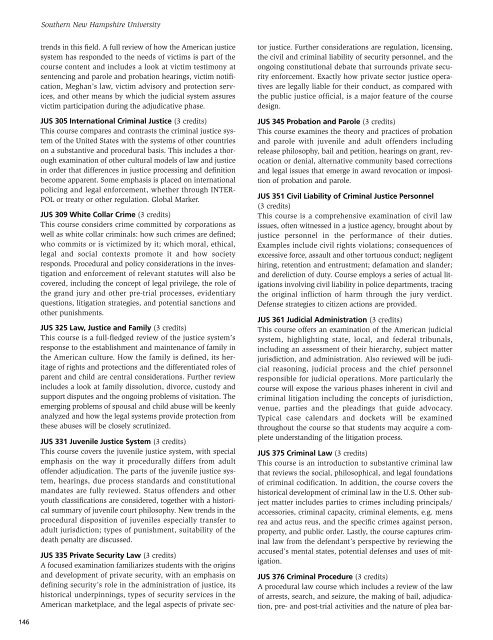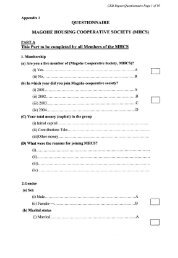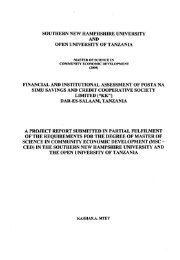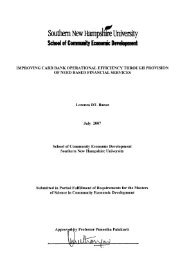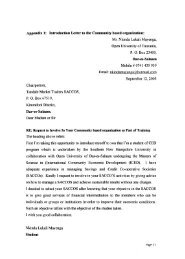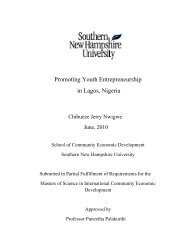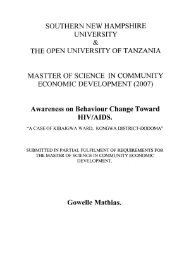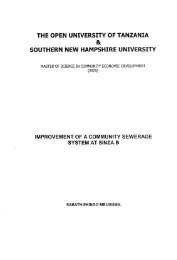Undergraduate Catalog 2010-2011 - SNHU Academic Archive ...
Undergraduate Catalog 2010-2011 - SNHU Academic Archive ...
Undergraduate Catalog 2010-2011 - SNHU Academic Archive ...
Create successful ePaper yourself
Turn your PDF publications into a flip-book with our unique Google optimized e-Paper software.
Southern New Hampshire University<br />
trends in this field. A full review of how the American justice<br />
system has responded to the needs of victims is part of the<br />
course content and includes a look at victim testimony at<br />
sentencing and parole and probation hearings, victim notification,<br />
Meghan’s law, victim advisory and protection services,<br />
and other means by which the judicial system assures<br />
victim participation during the adjudicative phase.<br />
JUS 305 International Criminal Justice (3 credits)<br />
This course compares and contrasts the criminal justice system<br />
of the United States with the systems of other countries<br />
on a substantive and procedural basis. This includes a thorough<br />
examination of other cultural models of law and justice<br />
in order that differences in justice processing and definition<br />
become apparent. Some emphasis is placed on international<br />
policing and legal enforcement, whether through INTER-<br />
POL or treaty or other regulation. Global Marker.<br />
JUS 309 White Collar Crime (3 credits)<br />
This course considers crime committed by corporations as<br />
well as white collar criminals: how such crimes are defined;<br />
who commits or is victimized by it; which moral, ethical,<br />
legal and social contexts promote it and how society<br />
responds. Procedural and policy considerations in the investigation<br />
and enforcement of relevant statutes will also be<br />
covered, including the concept of legal privilege, the role of<br />
the grand jury and other pre-trial processes, evidentiary<br />
questions, litigation strategies, and potential sanctions and<br />
other punishments.<br />
JUS 325 Law, Justice and Family (3 credits)<br />
This course is a full-fledged review of the justice system’s<br />
response to the establishment and maintenance of family in<br />
the American culture. How the family is defined, its heritage<br />
of rights and protections and the differentiated roles of<br />
parent and child are central considerations. Further review<br />
includes a look at family dissolution, divorce, custody and<br />
support disputes and the ongoing problems of visitation. The<br />
emerging problems of spousal and child abuse will be keenly<br />
analyzed and how the legal systems provide protection from<br />
these abuses will be closely scrutinized.<br />
JUS 331 Juvenile Justice System (3 credits)<br />
This course covers the juvenile justice system, with special<br />
emphasis on the way it procedurally differs from adult<br />
offender adjudication. The parts of the juvenile justice system,<br />
hearings, due process standards and constitutional<br />
mandates are fully reviewed. Status offenders and other<br />
youth classifications are considered, together with a historical<br />
summary of juvenile court philosophy. New trends in the<br />
procedural disposition of juveniles especially transfer to<br />
adult jurisdiction; types of punishment, suitability of the<br />
death penalty are discussed.<br />
JUS 335 Private Security Law (3 credits)<br />
A focused examination familiarizes students with the origins<br />
and development of private security, with an emphasis on<br />
defining security’s role in the administration of justice, its<br />
historical underpinnings, types of security services in the<br />
American marketplace, and the legal aspects of private sector<br />
justice. Further considerations are regulation, licensing,<br />
the civil and criminal liability of security personnel, and the<br />
ongoing constitutional debate that surrounds private security<br />
enforcement. Exactly how private sector justice operatives<br />
are legally liable for their conduct, as compared with<br />
the public justice official, is a major feature of the course<br />
design.<br />
JUS 345 Probation and Parole (3 credits)<br />
This course examines the theory and practices of probation<br />
and parole with juvenile and adult offenders including<br />
release philosophy, bail and petition, hearings on grant, revocation<br />
or denial, alternative community based corrections<br />
and legal issues that emerge in award revocation or imposition<br />
of probation and parole.<br />
JUS 351 Civil Liability of Criminal Justice Personnel<br />
(3 credits)<br />
This course is a comprehensive examination of civil law<br />
issues, often witnessed in a justice agency, brought about by<br />
justice personnel in the performance of their duties.<br />
Examples include civil rights violations; consequences of<br />
excessive force, assault and other tortuous conduct; negligent<br />
hiring, retention and entrustment; defamation and slander;<br />
and dereliction of duty. Course employs a series of actual litigations<br />
involving civil liability in police departments, tracing<br />
the original infliction of harm through the jury verdict.<br />
Defense strategies to citizen actions are provided.<br />
JUS 361 Judicial Administration (3 credits)<br />
This course offers an examination of the American judicial<br />
system, highlighting state, local, and federal tribunals,<br />
including an assessment of their hierarchy, subject matter<br />
jurisdiction, and administration. Also reviewed will be judicial<br />
reasoning, judicial process and the chief personnel<br />
responsible for judicial operations. More particularly the<br />
course will expose the various phases inherent in civil and<br />
criminal litigation including the concepts of jurisdiction,<br />
venue, parties and the pleadings that guide advocacy.<br />
Typical case calendars and dockets will be examined<br />
throughout the course so that students may acquire a complete<br />
understanding of the litigation process.<br />
JUS 375 Criminal Law (3 credits)<br />
This course is an introduction to substantive criminal law<br />
that reviews the social, philosophical, and legal foundations<br />
of criminal codification. In addition, the course covers the<br />
historical development of criminal law in the U.S. Other subject<br />
matter includes parties to crimes including principals/<br />
accessories, criminal capacity, criminal elements, e.g. mens<br />
rea and actus reus, and the specific crimes against person,<br />
property, and public order. Lastly, the course captures criminal<br />
law from the defendant’s perspective by reviewing the<br />
accused’s mental states, potential defenses and uses of mitigation.<br />
JUS 376 Criminal Procedure (3 credits)<br />
A procedural law course which includes a review of the law<br />
of arrests, search, and seizure, the making of bail, adjudication,<br />
pre- and post-trial activities and the nature of plea bar-<br />
146


